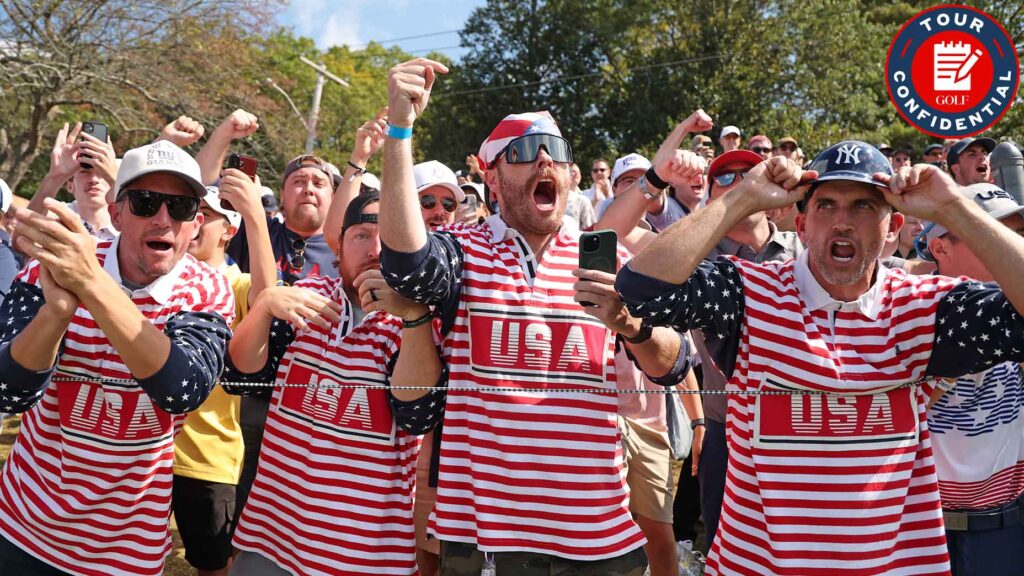The Aftermath of Ryder Cup 2023: An In-Depth Analysis of Fan Behavior, Leadership Decisions, and Future Prospects
The dynamics following the Ryder Cup can stir just as much conversation as the event itself. The recent tournament at Bethpage Black unveiled a blend of electrifying moments and unsettling fan behavior that sent shockwaves through the golfing community. As analysts dissect this year’s event, the pressing questions revolve around the need for better crowd management, team leadership choices, and the overall atmosphere that surrounds the cherished biennial tournament.
Fans are a crucial element of the Ryder Cup, often creating an electric atmosphere that enhances the competition. However, some instances of extreme heckling and disruptive behavior have raised alarms. Senior Editor Jessica Marksbury emphasized that while rowdy crowds add excitement, the vitriol witnessed at this year’s event crossed a line detrimental to the spirit of both the Ryder Cup and golf as a whole. Appropriate crowd behavior is key, and maintaining respect is crucial to preserving the tournament’s integrity.
Senior Writer Sean Zak also reflected on this concerning fan behavior, labeling it "un-controlled." The lack of adequate measures to handle disrespectful fans was apparent when some were removed rather than expelled from the property. This raises essential questions about protocols for crowd management. As Zak insists, clearer communication and more proactive measures from the event organizers could alleviate many of these challenges in future tournaments.
Rory McIlroy’s poignant comments highlighted the need for golf to uphold higher standards regarding spectator conduct, particularly during marquee events like the Ryder Cup. Disruptive behavior, such as slurs directed at players, is unacceptable. Jack Hirsh, Associate Equipment Editor, echoed this sentiment, advocating that those who engage in such behavior should reflect on their actions. The palpable tension calls for immediate action to ensure that future events provide a respectful environment for athletes and fans alike.
With the next Ryder Cup slated for 2025 at Adare Manor in Ireland, discussions surrounding team leadership have commenced. The possibility of Luke Donald returning for a third consecutive captaincy is highly debated. While Donald has demonstrated exceptional leadership, opinions vary on who should lead the American squad. Names like Keegan Bradley, Stewart Cink, Jim Furyk, and even Tiger Woods have emerged as potential candidates, each bringing unique qualities that could shape the U.S. team’s future.
Sean Zak speculated that Donald’s decision will hinge on understanding the competition he will face, subtly highlighting the importance of rival dynamics in captaincy decisions. The performance of the American team under previous captains complicates these discussions, with some suggesting it may be time for a fresh approach, particularly if the same leadership has not resulted in victory.
The tournament’s events raised questions around the role of playing-captains, particularly concerning Keegan Bradley, who opted not to include himself in Walter’s playing roster. Analysts acknowledged that Bradley could have made a significant contribution. With team dynamics evolving, it begs the question of whether future captains should be prepared for the dual role of leading while also competing to maximize the team’s potential.
Attention is also drawn to the ticket pricing for the Ryder Cup, which may have inadvertently restricted the audience to those less invested in the sport’s core values. Marksbury pointed out that the high cost deterred those who would typically foster a more respectful and appreciative atmosphere, possibly contributing to the unruliness observed.
The discussion around the Alfred Dunhill Links Championship also emerged, with analysts considering it one of the most underrated events on the professional circuit. Its visits to iconic courses in Scotland combine top-tier competition with spectacular scenery. This raises the question of how the allure of certain tournaments could be enhanced, regardless of inherent market visibility compared to marquee events.
The undeniable takeaway is that the Ryder Cup, while a glorious celebration of golf, possesses complexities that warrant thoughtful consideration from its organizers, stakeholders, and fans. As preparations for the next event begin, addressing crowd conduct, leadership selection, and participant experience are paramount. The fusion of thrilling competition with the essence of respect for the sport can ensure the Ryder Cup remains a beloved tradition for generations to come.
In conclusion, ongoing dialogues about fan behavior, leadership roles, and the overall event experience will shape how future Ryder Cups unfold. The balance between maintaining an electric atmosphere and ensuring respectful conduct must be prioritized, setting a benchmark for what sportsmanship should mean within golf. With a few improvements in communication and management, the Ryder Cup can continue to thrive as a beacon of camaraderie and competition.
By focusing on these critical points in a well-structured article, we encapsulate the crucial elements of the post-Ryder Cup conversation while optimizing for SEO engagement. Each paragraph addresses a unique aspect, appealing to broader audience interests while embedding vital keywords to strengthen search relevance.


